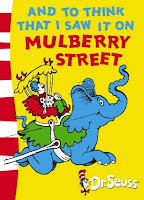And to Think That I Saw it on Mulberry Street by Dr Seuss (2003)
, 13 February 2016
I love Dr Seuss' books. I think they are not only good for children, but also for adults. They all teach important lessons, values, ethical behaviour, they are lay and universal, and they always ground me. Dr Seuss' books are about what life should be. Life is crazy (his crazy texts, unusual stories, and outrageous colours are just that), but it not just about what you see, it is about how you relate to people, how you see and relate to the world, and how you feel.
"And to Think That I Saw It on Mulberry Street" is a book about the beauty of the ordinary and of savouring the small things in life. It is also a book about the importance of imagination and how imagination works. The story also captures how fables and legends were born centuries ago, how small things were put together to be turned into a unreal fantasy.
This story has aged well with regards to some points but not others, but it is more relevant than ever for modern kids. Originally written in 1937, it is obvious in 2016 that most small children in developed countries don't walk alone to/back school, not even with pals, they are driven to/from school by their parents or accompanied by caretakers in school buses. Of course, there are countries where children walk Kms to go to school, so perhaps for those the story is as fresh as it was when it was written. On the other hand, the role of imagination in the education of children isn't as prominent as it was 30-50 years ago -- nowadays there is an ubiquity of visual imagined worlds presented to kids already masticated in TV programs and movies, too many kids aren't told or read stories before bed, and too many are parked in front of TVs, tablets and smartphones numbing their imagination when they should be using it the most.
> Play a game with you children and ask them to do the same the character, that is, to tell you something that caught their attention during the day and create a story about it that they will then tell you.
> Play the play game "lie or fantasy?" You tell something to your kid and ask him/er to tell you if that is a lie or a fantasy and why? Depending on the level of success in the reply, explain to them why telling a invented story and a lie of a story are two different things.
> Ask you children if imagination is good and why.
> Ask your children, do you imagine things at times? Which sort of stories do you imagine?
> Ask your children, why do you think Marco imagines things the way he does? Does the story makes any sense to you?
> Ask you children anything else you come up with using the book.













Post a Comment
Comments are Moderated
Note: only a member of this blog may post a comment.